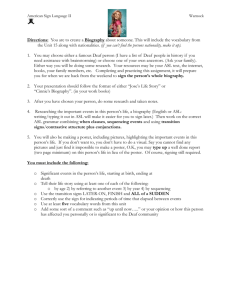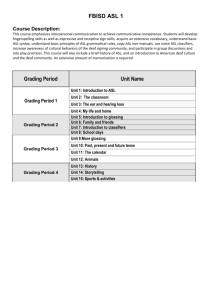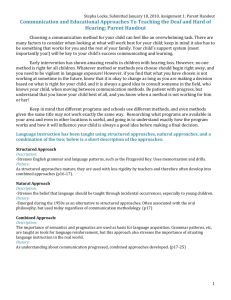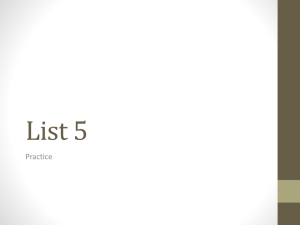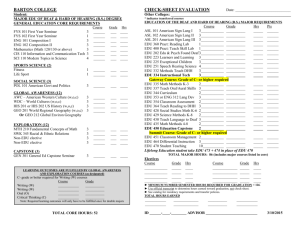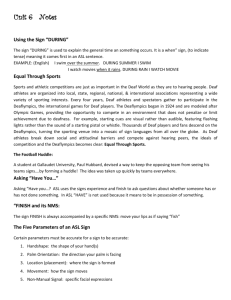Interview
advertisement
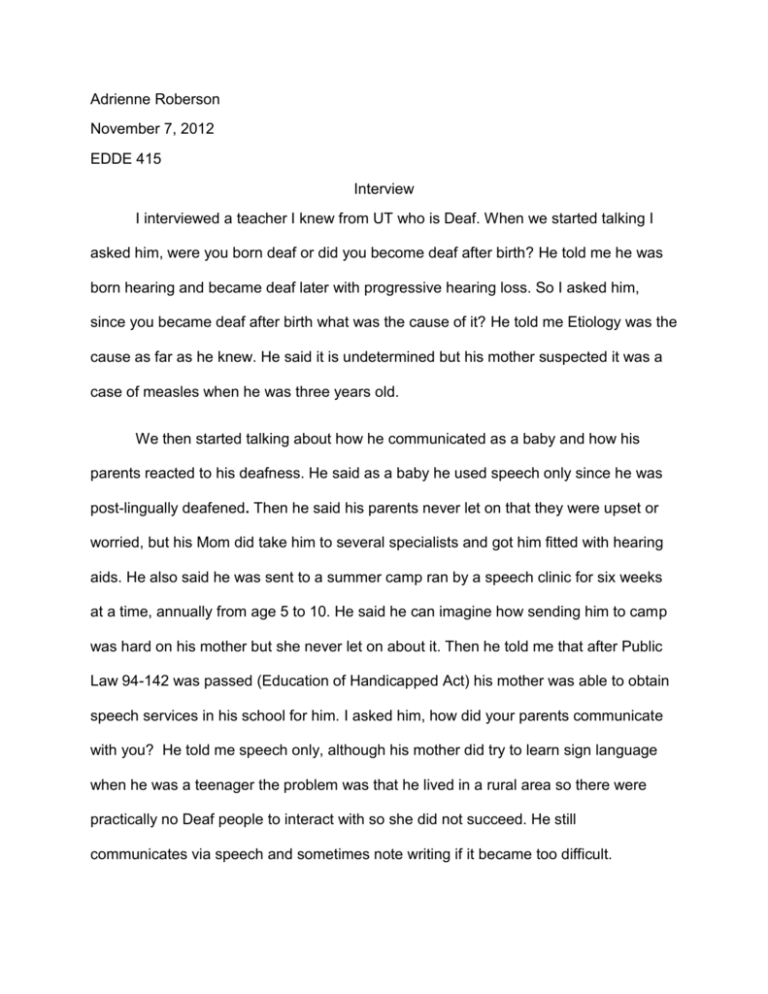
Adrienne Roberson November 7, 2012 EDDE 415 Interview I interviewed a teacher I knew from UT who is Deaf. When we started talking I asked him, were you born deaf or did you become deaf after birth? He told me he was born hearing and became deaf later with progressive hearing loss. So I asked him, since you became deaf after birth what was the cause of it? He told me Etiology was the cause as far as he knew. He said it is undetermined but his mother suspected it was a case of measles when he was three years old. We then started talking about how he communicated as a baby and how his parents reacted to his deafness. He said as a baby he used speech only since he was post-lingually deafened. Then he said his parents never let on that they were upset or worried, but his Mom did take him to several specialists and got him fitted with hearing aids. He also said he was sent to a summer camp ran by a speech clinic for six weeks at a time, annually from age 5 to 10. He said he can imagine how sending him to camp was hard on his mother but she never let on about it. Then he told me that after Public Law 94-142 was passed (Education of Handicapped Act) his mother was able to obtain speech services in his school for him. I asked him, how did your parents communicate with you? He told me speech only, although his mother did try to learn sign language when he was a teenager the problem was that he lived in a rural area so there were practically no Deaf people to interact with so she did not succeed. He still communicates via speech and sometimes note writing if it became too difficult. We then moved into talking about phonology, lexicon, grammar, and communication. I asked him to thinking about these four words and if he remembers how they were used in his language learning. He said he had the typical regular education experience and went through pretty much the same curriculum as his hearing peers: starting with letter identification, phonemic awareness, using basal readers, moving to regular (trade) books, penmanship, learning to spell and define vocabulary, taking English lessons (which mostly focused on writing skills including grammar), doing presentations in front of class and he said that yes he spoke aloud. In terms of ASL, he never really paid any attention to any of the four things as he was just trying to use it to communicate with his peers. Formal instruction in ASL was a waste of time as far as he was concerned. He said he took a sign class for two weeks before he dropped it because he was learning faster outside of class with his Deaf peers. His formal knowledge of ASL structures did not develop until he became a teacher of the deaf and took workshops. He said everything just came together and he was able to use his knowledge of English as a contrast to similar structures/functions in ASL. I then asked him if there were any of the four that were hard for him. He said oddly enough he could never really grasp all the labels they had for grammatical/syntax structures and he never needed them to succeed as a writer. He said the reason is because he was a prolific reader and wrote according to what looked right based on his reading knowledge. None of the others were ever a problem and fortunately he was able to hear enough to communicate and learn the nuances of social communication. With ASL, it was the opposite; I actually understand the linguistic structures used no problems with any of the four areas. His favorite area is discourse analysis. The next thing we talked about was how he learned to sign and communicate with other children. He said he learned ASL at the age of 18 when he started college. He said he was surrounded by Deaf people 24/7 so he picked it up readily. He said there were a good number of peers just like him who also started learning ASL there also. He told me most of them became proficient bilingual ASL and English users. I then asked him to talk a little bit about growing up deaf. What kind of school he attended and what kind of services he received? He said he remained in the local schools in his hometown until he graduated from HS. During his elementary years he said things were good. He did not have difficulty until he entered junior HS (now called Middle School) with so many different teachers and classes and in a much larger school. He did manage to adapt well enough but it was not an optimal communication environment. He said the only services he received were speech therapy, which did not start until he was in 5th grade after the law mandated special education services (P.L. 94-143). He said he did okay. He considered himself pretty normal and did pretty much the normal adolescent things that boys do. He participated in sports but not in leadership/student organizations until college. I then asked him where he attended college. He said he attended National Technical Institute for the Deaf (NTID) at Rochester Institute of Technology. He majored in Biology and got his B.S. degree. He said those were the best years of his life. The last subject we talked about was his children. I asked him if he had any children and if they were deaf or hearing. He told me he had a daughter age 7 and a son aged 4, who are both hearing. I asked him how communication between them was. He said communication is somewhat interesting. He said he would call it a mixture of ASL and spoken language with a lot of shifting between the two. He said his kids are still learning ASL and English. Receptively they have little trouble understanding ASL but still working on expressive skills. This assignment was really interesting to me. I learned a lot about how this teacher learned communication. His story is so interesting compared to some other deaf people I have talked to. This teacher really grew up “hearing” as a deaf person. I think it is unusual how he did not learn to sign until he graduated high school and started into college. For him I am glad he eventually learned ASL so communication will be easier for him even though he seemed to do well before he learned ASL. I am glad I chose this person to interview because it has really opened my eyes to how deaf people really get a long in life in regards to communication and learning language.
